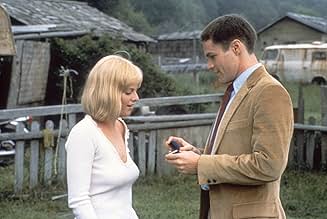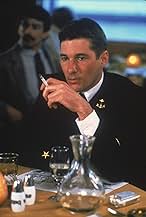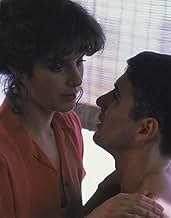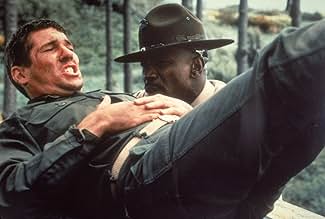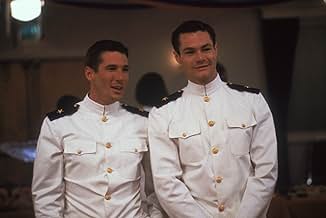Un joven debe completar su trabajo como oficial en la escuela para convertirse en aviador, con la ayuda de un sargento y su nueva novia.Un joven debe completar su trabajo como oficial en la escuela para convertirse en aviador, con la ayuda de un sargento y su nueva novia.Un joven debe completar su trabajo como oficial en la escuela para convertirse en aviador, con la ayuda de un sargento y su nueva novia.
- Ganó 2 premios Óscar
- 10 premios ganados y 15 nominaciones en total
Mara Scott-Wood
- Bunny
- (as Mara Scott Wood)
- Dirección
- Guionista
- Todo el elenco y el equipo
- Producción, taquilla y más en IMDbPro
Opiniones destacadas
Though ribbed by some critics for being a crude update of the formula film romances of the 1940's, audiences still showed up in droves to see this film and turned it into one of the biggest grossers of 1982. While the film may certainly follow the general formulaic outlines of the genre, director Taylor Hackford and screenwriter Douglas Day Stewart dodge sentimentalization with a healthy dosage of grim reality. This is no longer the ultra-glamorized world of old Hollywood; AN OFFICER AND A GENTLEMAN is a movie about love in the real world. By not sheltering it's lovers from the harsh nature of humanity, the film manages to have a significantly greater impact as it works toward a deservedly optimistic ending.
In a role turned down by both John Travolta and John Denver, Richard Gere lends a brooding intensity that electrifies what could have been a bland protagonist. Debra Winger, with her down-home sexiness at it's peak, turns in a fascinating portrayal of small town frustration, and Louis Gossett Jr nearly steals the picture in a harrowing, Oscar-winning performance. In fact, Gere's relationship with Gossett's Drill Sargent is just as involving as his love affair with Winger. The supporting cast is also well-cast, with David Keith, Robert Loggia, and Lisa Blount delivering standout performances.
In a role turned down by both John Travolta and John Denver, Richard Gere lends a brooding intensity that electrifies what could have been a bland protagonist. Debra Winger, with her down-home sexiness at it's peak, turns in a fascinating portrayal of small town frustration, and Louis Gossett Jr nearly steals the picture in a harrowing, Oscar-winning performance. In fact, Gere's relationship with Gossett's Drill Sargent is just as involving as his love affair with Winger. The supporting cast is also well-cast, with David Keith, Robert Loggia, and Lisa Blount delivering standout performances.
Excellent love story about a young man (Gere, in an engaging performance) who dreams of being a Navy jet pilot and a girl (Winger) who wishes to escape the life in a paper mill. The film is strikingly rich, romantic and features stand out performance from Robert Loggia, David Keith and Oscar winner, Gossett, as a brass hearted drill instructor. Director Hackford shows us some old fashioned filmmaking here...and it's damn good.
An Officer and a Gentleman is a well-crafted melodrama set against the back drop of the elite Naval Aviator training facility in upstate Washington. Richard Gere portrays Zachary Mayo, a young man and son of a career sailor who has risen from residing above a house of ill repute in the Philippines to becoming an officer's candidate destined to fly jets.
Gere is terrific as Mayo, and works incredibly hard to combine the complex emotions of the character with his seemingly, simplistic facade. Gere is supported by a great cast including Debra Winger as the young factory worker who yearns of a better life with Mayo, David Keith as a cadet who's not all that he seems, and the legendary Louis Gossett, Jr. as Gunnery Sgt. Emil Foley, Mayo's adamant and hard-edged drill instructor who remains Zach's total bane of existence. Gossett won a well-deserved Oscar for this role, and he remains the true highlight of this film.
Some have called An Officer and a Gentlemen out-dated, improbable, and too melodramatic, and perhaps it is all of these. But, it is so entertaining and so enthralling, I find it easily to become enveloped by the picture's story and characters. You want them all to succeed, and you feel for them when they fail. This is the true mark of a truly great film.
Highly recommended.
Gere is terrific as Mayo, and works incredibly hard to combine the complex emotions of the character with his seemingly, simplistic facade. Gere is supported by a great cast including Debra Winger as the young factory worker who yearns of a better life with Mayo, David Keith as a cadet who's not all that he seems, and the legendary Louis Gossett, Jr. as Gunnery Sgt. Emil Foley, Mayo's adamant and hard-edged drill instructor who remains Zach's total bane of existence. Gossett won a well-deserved Oscar for this role, and he remains the true highlight of this film.
Some have called An Officer and a Gentlemen out-dated, improbable, and too melodramatic, and perhaps it is all of these. But, it is so entertaining and so enthralling, I find it easily to become enveloped by the picture's story and characters. You want them all to succeed, and you feel for them when they fail. This is the true mark of a truly great film.
Highly recommended.
I went to Navy OCS (for ship drivers, not aviators) a year after this movie came out. A lot of us considered it one of the best movies ever made. Despite the fact that there is some serious license taken with reality, the movie captures the intensity and high stakes of OCS, and how people who barely know each other become bonded so quickly; how the least likely candidates sometimes become the star performers; how some people are changed beyond recognition by the experience. There was never a lack of old hands like Sid's father, telling you you had it easy because of some difference in the rules he didn't enjoy 10 years earlier. DOR is translated by Foley as "drop on request". In 1983, the terminology was DE, which meant dis enroll. I always wondered what happened to the candidates in my class who DE'd. The ones who graduated I kept running into in the fleet, sometimes in places like the Philippines. The most unrealistic thing about the movie was the premise that local girls want to marry officer candidates. Not so in Pensacola or Newport RI, where OCS was in those days. The locals actually called us behind our backs "cockroaches" because we wore all black and had to run away to our barracks by 10 pm. The second most unrealistic thing was the foul language. That comes later, in the fleet, but not in OCS. No we did not have martial arts duels. All in all, however, the essence of the experience, if not the specifics, is found in the movie. One of our marching songs went "left right left right / you HAD a good job and you LEFT / you're RIGHT!" We really did have nowhere else to go. I say 10 stars. The VHS version gets only 8 because of changes to the soundtrack songs.
Released in 1982, "An Officer and a Gentleman" was the obvious inspiration of films like Tom Cruise's "Top Gun" and "Days of Thunder." "An Officer and a Gentleman" was the first and best, by far.
The plot similarities are obvious: They all include the angry young man who needs to prove his gifting, the uncompromising mentor, the encouraging babe, the craft, the arena and the doomed buddy. In "An Officer" the angry young man is Richard Gere as Mayo, the mentor is Louis Gossett Jr. as Drill Instructor Folely, the babe is Paula (Debra Winger), the craft is aviation basic training, the arena is a Naval academy and the Puget Sound area of Washington (shot on location) and the buddy is Sid Worley (David Keith).
Thankfully, the film doesn't get bogged down telling the back-story of Mayo. Instead, it ingeniously shares his past in a matter of minutes at the very beginning. It's all we need to know to understand why Mayo is the way he is. And then we're off to basic training where he's tested. Does he have what it takes? Can someone as lowborn, aloof and un-trusting as Mayo make it as an officer?
Debra Winger and Lisa Blount shine here as Mayo and Worley's babes. Winger is alluring in a humble "girl next door" type of way (she out-shined Lynda Carter as Wonder Girl on "Wonder Woman," which is hard to believe), but Blount is even more alluring -- yes, despite the negative aspects of her character. I'll just put it this way, she really fills out a pair of jeans, lol.
Both couples get intimate way too quickly, but maybe this is one of the flaws of the "Puget Debs" and explains why they have a problems getting marriage material, if you know what I mean. Besides this, time has to be condensed in a two-hour film.
BOTTOM LINE: If you're in the mood for a film of this ilk "An Officer and a Gentleman" is the best of the lot.
GRADE: A
INSIGHTS ABOUT THE ENDING (***SPOILER ALERT*** Don't read further unless you've seen the film):
An officer is a military leader. Drill Instructor Foley's job is to weed out those who can't hack it as an officer. It's an important job because people's lives in combat are dependent on the quality of the leaders and Foley takes his job seriously.
Foley rightly pegs Mayo as a lowlife loner from the outset -- a wannabe officer -- and therefore puts on the pressure. This is especially so on the one weekend where he has Mayo to himself. Foley does everything he can to make Mayo break AND quit, but Mayo doesn't. He breaks, indeed, but he refuses to quit on the grounds that he has no where to go. At the end of this scene you can see that Foley develops respect for Mayo (which you get a glimpse of earlier when Mayo does extremely well on the obstacle course).
Later, Mayo disregards breaking the record on the obstacle course (which he was definitely able to do) in order to encourage Seegar (the female recruit) to finally make it over the wall. Foley sees that Mayo's no longer the aloof and selfish loner he was when he rode in on his motorcycle. He's matured; he's developed character. It was already there, of course, but the boot camp training has brought it to the fore, and Foley sees it.
After Worley's tragic death, Mayo confronts Foley while he's drilling the platoon. Foley informs Mayo that they all know what happened and even tells him they're sorry about Worley. He didn't have to do this and it shows that Foley isn't just an honorable man, but also that he cared about Worley. After all, Worley was only one week away from graduating! In a sense, he was one of Foley's kids. In other words, Foley and the platoon were grieving too. But Mayo was closest to Worley and he's crazy with shock & grief at this point. He insists that he's going to quit, to which Foley tells him to meet him for a fight. Sure, there's some testosterone in his words, but he actually does this out of respect for Mayo as a last ditch effort to keep him from dropping out.
And Foley doesn't "kick his axx", as some claim. It was essentially an even match and Foley barely walks off the mat, which is the only reason he technically wins. But that's inconsequential. The purpose of the fight was to run Mayo's steam out so he didn't make a rash decision in an obvious moment of grief & anger. Foley accomplished his purpose. Once Mayo was no longer blinded by rage he makes the right choice and graduates.
This is why he thanks Foley at the end.
The plot similarities are obvious: They all include the angry young man who needs to prove his gifting, the uncompromising mentor, the encouraging babe, the craft, the arena and the doomed buddy. In "An Officer" the angry young man is Richard Gere as Mayo, the mentor is Louis Gossett Jr. as Drill Instructor Folely, the babe is Paula (Debra Winger), the craft is aviation basic training, the arena is a Naval academy and the Puget Sound area of Washington (shot on location) and the buddy is Sid Worley (David Keith).
Thankfully, the film doesn't get bogged down telling the back-story of Mayo. Instead, it ingeniously shares his past in a matter of minutes at the very beginning. It's all we need to know to understand why Mayo is the way he is. And then we're off to basic training where he's tested. Does he have what it takes? Can someone as lowborn, aloof and un-trusting as Mayo make it as an officer?
Debra Winger and Lisa Blount shine here as Mayo and Worley's babes. Winger is alluring in a humble "girl next door" type of way (she out-shined Lynda Carter as Wonder Girl on "Wonder Woman," which is hard to believe), but Blount is even more alluring -- yes, despite the negative aspects of her character. I'll just put it this way, she really fills out a pair of jeans, lol.
Both couples get intimate way too quickly, but maybe this is one of the flaws of the "Puget Debs" and explains why they have a problems getting marriage material, if you know what I mean. Besides this, time has to be condensed in a two-hour film.
BOTTOM LINE: If you're in the mood for a film of this ilk "An Officer and a Gentleman" is the best of the lot.
GRADE: A
INSIGHTS ABOUT THE ENDING (***SPOILER ALERT*** Don't read further unless you've seen the film):
An officer is a military leader. Drill Instructor Foley's job is to weed out those who can't hack it as an officer. It's an important job because people's lives in combat are dependent on the quality of the leaders and Foley takes his job seriously.
Foley rightly pegs Mayo as a lowlife loner from the outset -- a wannabe officer -- and therefore puts on the pressure. This is especially so on the one weekend where he has Mayo to himself. Foley does everything he can to make Mayo break AND quit, but Mayo doesn't. He breaks, indeed, but he refuses to quit on the grounds that he has no where to go. At the end of this scene you can see that Foley develops respect for Mayo (which you get a glimpse of earlier when Mayo does extremely well on the obstacle course).
Later, Mayo disregards breaking the record on the obstacle course (which he was definitely able to do) in order to encourage Seegar (the female recruit) to finally make it over the wall. Foley sees that Mayo's no longer the aloof and selfish loner he was when he rode in on his motorcycle. He's matured; he's developed character. It was already there, of course, but the boot camp training has brought it to the fore, and Foley sees it.
After Worley's tragic death, Mayo confronts Foley while he's drilling the platoon. Foley informs Mayo that they all know what happened and even tells him they're sorry about Worley. He didn't have to do this and it shows that Foley isn't just an honorable man, but also that he cared about Worley. After all, Worley was only one week away from graduating! In a sense, he was one of Foley's kids. In other words, Foley and the platoon were grieving too. But Mayo was closest to Worley and he's crazy with shock & grief at this point. He insists that he's going to quit, to which Foley tells him to meet him for a fight. Sure, there's some testosterone in his words, but he actually does this out of respect for Mayo as a last ditch effort to keep him from dropping out.
And Foley doesn't "kick his axx", as some claim. It was essentially an even match and Foley barely walks off the mat, which is the only reason he technically wins. But that's inconsequential. The purpose of the fight was to run Mayo's steam out so he didn't make a rash decision in an obvious moment of grief & anger. Foley accomplished his purpose. Once Mayo was no longer blinded by rage he makes the right choice and graduates.
This is why he thanks Foley at the end.
¿Sabías que…?
- TriviaDirector Taylor Hackford purposely kept Louis Gossett Jr. living in separate quarters from the rest of the cast to further his character's intimidating presence as a drill instructor.
- ErroresJust before the officer candidates take the oath and graduate, a recruit announces, "All officers present." The candidates' swords are up on their shoulders, but in the next shot, the swords are in their scabbards.
- Créditos curiososWith special thanks to Art Kulman of the Washington State Dept. of Commerce & Economic Development, Fort Worden State Park, Gus Gustafson, Brent Shirley, and the people of Port Townsend, Washington.
- Versiones alternativasNBC cut 6 minutes from this film for its 1986 network television premiere.
- Bandas sonorasUp Where We Belong
Sung by Joe Cocker and Jennifer Warnes
Lyric by Will Jennings
Music by Jack Nitzsche and Buffy Sainte-Marie
Recording produced by Stewart Levine
Selecciones populares
Inicia sesión para calificar y agrega a la lista de videos para obtener recomendaciones personalizadas
- How long is An Officer and a Gentleman?Con tecnología de Alexa
Detalles
- Fecha de lanzamiento
- País de origen
- Idiomas
- También se conoce como
- An Officer and a Gentleman
- Locaciones de filmación
- Fort Worden State Park - 200 Battery Way E, Port Townsend, Washington, Estados Unidos(Point Wilson Lighthouse where GySgt Foley is conducting "Incentive Training" with Mayo running "rifle drills" on the beach.)
- Productoras
- Ver más créditos de la compañía en IMDbPro
Taquilla
- Presupuesto
- USD 7,500,000 (estimado)
- Total en EE. UU. y Canadá
- USD 129,795,554
- Fin de semana de estreno en EE. UU. y Canadá
- USD 3,304,679
- 1 ago 1982
- Total a nivel mundial
- USD 129,795,890
Contribuir a esta página
Sugiere una edición o agrega el contenido que falta






